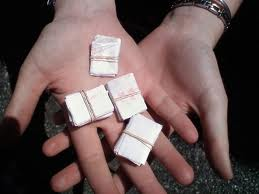While the city worried a great deal about teen pregnancy rates in the early 70’s, among our mostly Dominican students it wasn’t considered a particular problem. Girls
simply got pregnant earlier, and the boys married them and went to work. That was the norm, and they really couldn’t see what the problem was.
We also lost many other students each year, most of whom had acquired some English, but did not do well on reading tests. Naturally, the poverty rate was high, which in educational language made us a Title I school, which entitled the vast majority of our students to free lunches. And, of course, like many other schools with similar demographics, there was a drug problem, a very large drug problem.
If you knew what to look for, the problem was visible all over school. Heroin came in little
glassine envelopes. After their content had been used, something had to be done with them, and so they were folded as small as possible and tucked into whatever nook was available, usually in staircases or other remote locations in the school building. Yet, they were visible to almost anyone, although the users tried to be circumspect.
The police dealt with the problem in their usual way, by arresting students outside of school who were visibly nodding because they were high or strung out. To deal with this very large mess, I was asked to organize a drug abuse prevention program.
What I did was meet informally with individual students, most of them gang members or drug users, and establish some kind of friendly relationship with them. I also asked them to come to my office, to either just hang out or participate in group talks. Nearly
all elected to take part in groups. They loved to talk about their lives, and as for me, these groups were a real learning experience. They also spent a lot of time in my “office”, a fifth floor locker room with its own bathroom. This was not only my turf, but it also became theirs, and they protected it. Although the office was always open, and I was usually roaming the school halls or the cafeteria, nothing was ever taken out of the office, and my gang members and drug users became very good at taking phone messages, and referring other students to me.
In the cafeteria I became the good friend of the drug dealers; I don’t like using the term “pushers,” because it is a misnomer. Drugs don’t have to be “pushed.” They are so seductive that no “pushing” is required. However, because I spent so
much time with these people, without being threatening, just chatting and being quite
pleasant, I cramped their style and made if very difficult to sell drugs in the
cafeteria. Naturally, there were also the after school emergencies such as family strife, evictions and suicide attempts in which I was asked by students to become involved, but almost miraculously, drug use went way down at George Washington, and a year later I received a letter from the 31st Precinct, the local constabulary, congratulating me on my work and saying that they hadn’t arrested anyone for possession of illegal substances in the vicinity of the school in the previous six months.
I’m not really sure that what I was doing was really related to the reduced drug use in the school; it might or might not have been, but I was really pleased by that letter.

